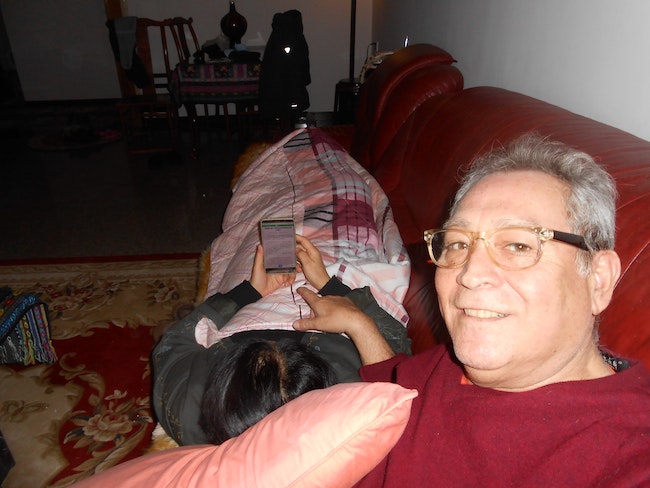 Dago Benavidez and his wife in quarantine in China. (Courtesy/Dago Benavidez)
Dago Benavidez and his wife in quarantine in China. (Courtesy/Dago Benavidez)
During the month Dago Benavidez quarantined himself in Guilin, China, he would watch a small, white husky from the window of his fifth-floor condo.
He noticed the owner’s routine as they took the dog outside to walk it. One day, the husky took off like a bullet to chase after another little dog.
Instead, the little guy started chasing the husky, who hightailed it back to its owners.
“That was my entertainment,” Benavidez said.
The south Salem resident and his wife were visiting his mother-in-law for Chinese New Year on Jan. 25 when the COVID-19 outbreak brought Chinese daily life to a grinding halt.
He described a city on lockdown, with cars rolling by airing alerts to stay indoors, shuttered restaurants and drug stores that required shoppers to check in and out.
The city Benavidez was in is much further south than Wuhan, which is considered to be the epicenter of the novel coronavirus. But the apocalyptic feeling was the same.
“Even though it was 500 miles away, it definitely it felt like an ominous presence on top of everything,” he said.
Benavidez, 66, said around Feb. 2 his sister called and told him airlines were canceling flights out of China. He tried to make arrangements to leave earlier but wouldn’t make it out of the country until 22 days later because flights kept getting cancelled.
He first noticed people wearing masks and then the streets got emptier. Benavidez said he got most of his information from the U.S. because Chinese authorities censored what they were telling residents.
During that time, he mostly stayed inside save for some outings to the grocery store. He couldn’t leave the city because roads were blocked, and government officials were checking people’s temperatures at every apartment.
“It was pretty eerie,” he said.
Benavidez said they ate a lot of fruit and his wife’s family kept them well stocked.
But, he said, “At one point my wife was going to get some rice, and they were out of rice because the factory wasn’t making any.”
 Dago Benavidez would watch a dog outside his condo window while quarantined in China. (Courtesy Dago Benavidez)
Dago Benavidez would watch a dog outside his condo window while quarantined in China. (Courtesy Dago Benavidez)
Benavidez grew up in Salem and doesn’t speak Chinese, but he’s been to the country several times. He said he was very aware of his personal boundaries on his most recent visit. Normally, he said people would be shoving and elbowing on the bus.
“This time there was none of that,” he said.
Everyone was wearing masks, he and his wife included.
They had to check in and out of their condo building. When they went to the drug store, they had to use their phones to register and do it again when they came out so officials would know what they were buying.
“If you bought anything pertaining to cold medicine somebody would come visit you,” Benavidez said.
He said he started to get anxiety attacks from being trapped in a room in a country where he didn’t speak the language and people were shying away from each other. People were scared, he said.
When he and his wife returned home, they had to fill out forms on the plane asking where they had been. Benavidez said the Shanghai airport, normally bustling, was eerie from the lack of people walking around.
When they landed in Los Angeles, he said there was a gauntlet of questions from health workers and temperature checking.
The day after he got home, Benavidez got a call from the Centers for Disease Control and Prevention asking him to self-quarantine for two weeks and check his temperature twice a day. His quarantine ends on March 11.
Benavidez said thankfully, he hasn’t had any symptoms.
“My hands are so damn dry that they look like leather from washing them,” he said.
When he first got back, he was happy not to have to wear a mask, but he felt like people didn’t realize the scope of what was going to hit the U.S.
“It feels good to pretend it’s not coming,” he said. “But I feel like what I saw over there… is possible. If it happens over here, it’s not going to be good. It’s going to really impact us.”
Have a tip? Contact reporter Saphara Harrell at 503-549-6250, [email protected] or @daisysaphara.









